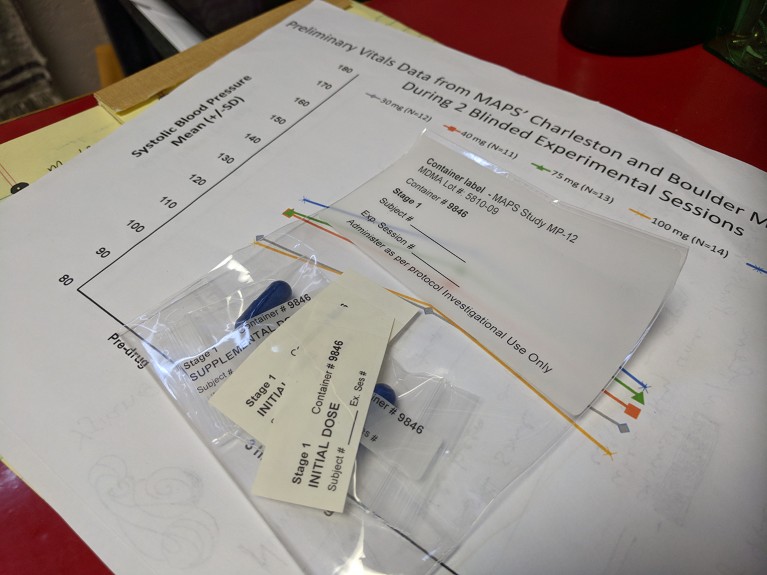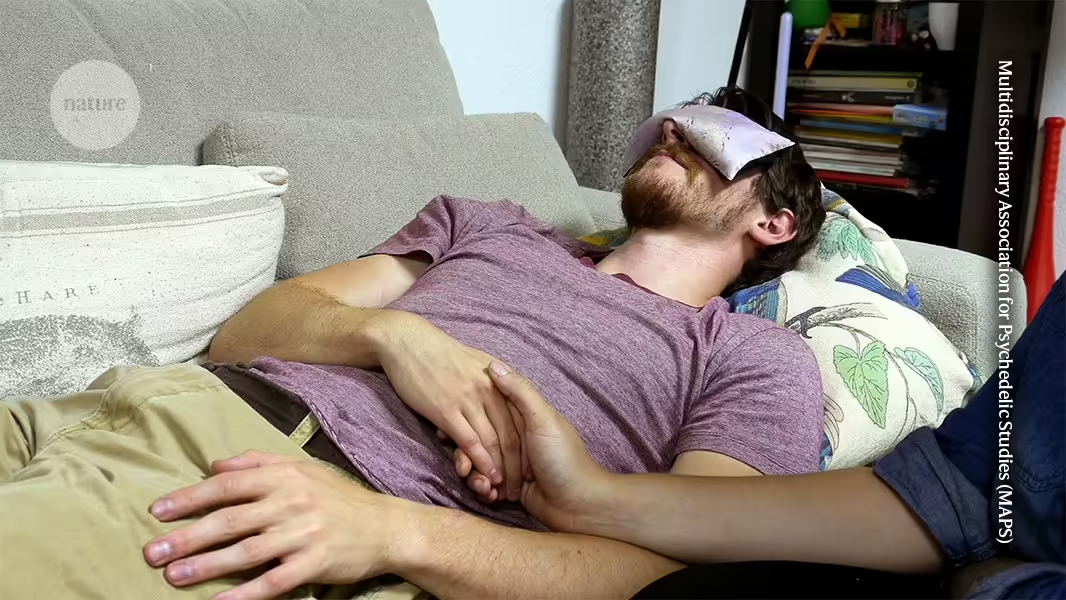Last week’s decision by the US Food and Drug Administration (FDA) to reject MDMA, also known as ecstasy, as a psychiatric treatment surprised many researchers. Lykos Therapeutics, the San Jose, California-based company that has been testing MDMA, plans to ask the FDA to reconsider the decision, but scientists are now wondering what the agency’s ruling will mean for other potential psychedelic therapies.
In a press release posted on 9 August, Lykos said that the FDA had sent a letter requesting that the company undertake another large-scale trial of the drug in people with post-traumatic stress disorder (PTSD) and resubmit its application.
“The FDA request for another study is deeply disappointing,” Lykos chief executive Amy Emerson said in the release, adding that the company plans to work with the agency to “resolve scientific disagreements”. Conducting another study “would take several years”, she said, and added that Lykos has already addressed many of the FDA’s concerns.
In an e-mail to Nature, Lykos declined to provide the complete letter detailing the agency’s specific concerns and directed the news team instead to its release. Experts say that without access to the letter, it’s hard to determine why the FDA reached the decision it did. “We really are going off incomplete information,” says Mason Marks, who studies drug policy at Florida State University in Tallahassee, adding that he was “a little surprised” by the agency’s decision.
Trial concerns
But Marks points out that the FDA typically follows the advice of its independent advisory committees — and the one that evaluated MDMA in June overwhelmingly recommended against approving the drug, citing problems with clinical trial design that the advisers felt made it difficult to determine the drug’s safety and efficacy. One concern was about the difficulty of conducting a true placebo-controlled study with a hallucinogen: around 90% of the participants in Lykos’s trials guessed correctly whether they had received MDMA or a placebo, and the expectation that the drug should have an effect might have coloured their perception of whether it treated their symptoms.
Another concern was about Lykos’s strategy of administering the drug alongside psychotherapy. Rick Doblin, founder of the nonprofit organization that created Lykos — the Multidisciplinary Association for Psychedelic Studies (MAPS) — has said that he thinks the drug’s effects are actually due to talk therapy. MDMA is thought to help people with PTSD be more receptive and open to revisiting traumatic events with a therapist. But because the FDA doesn’t regulate talk therapy, the agency and advisory panel struggled to evaluate this claim. “It was an attempt to fit a square peg into a round hole,” Marks says.

It’s not yet clear how the agency’s decision will affect future applications for other psychedelics in late-stage trials for treating psychiatric disorders, including psilocybin — the active ingredient in magic mushrooms — and lysergic acid diethylamide, otherwise known as LSD. Boris Heifets, an anaesthesiologist at Stanford University in California who studies psychedelics, doubts that any companies developing these drugs will include a psychotherapy component in their submission to the FDA. “That kind of confusion did not help Lykos”, he says, and the interventions’ respective effects are difficult to untangle.
Downstream effects?
Glenn Cohen, a bioethics and law specialist at Harvard University in Cambridge, Massachusetts, says that some companies appear to already be moving away from psychotherapy as part of their treatment protocols. Compass Therapeutics in Boston, Massachusetts, which is conducting a phase III trial of psilocybin as a treatment for depression, says that psychotherapy is not a component of the trial. And atai Life Sciences in Berlin, Germany, is excluding anyone from participating in its late-stage trial of the psychedelic dimethyltryptamine (DMT) for depression who has recently started talk therapy. Studying the effects of psychedelics in isolation could make the FDA review process smoother, Cohen says, although this approach “is contrary to the ethos of many who have been pressing for approval and acceptance of these substances”.
Some of the worries around MDMA seem specific to MAPS and Lykos. An investigation released in May by the nonprofit Institute for Clinical and Economic Review in Boston, Massachusetts, alleged that Lykos therapists pressured study participants to report only positive results and that its employees’ advocacy for the drug affected the participants’ judgement. Another controversy involved an unlicensed therapist working for MAPS at a trial site in Canada: the therapist was sued for sexually assaulting a participant who was under the drug’s influence.
It’s unclear whether the FDA is investigating these controversies or how much they played into its decision. But others are taking action. On 10 August, the journal Psychopharmacology retracted three papers1 , 2 , 3 published by Lykos owing to “protocol violations amounting to unethical conduct” at the Canadian site. The journal said that the authors had not disclosed the problems to Psychopharmacology and had inappropriately included data collected at this site.
The retracted studies are not the two phase III trials that the FDA relied on to evaluate the drug’s efficacy. Data from those were published in Nature Medicine in 20214 and 20235. In a statement, a spokesperson for the journal said it is not taking any action at the moment but “of course will continue to follow the developments of the case and will reassess the papers should new information come to our attention”. (Nature is editorially independent of Nature Medicine.)
In the meantime, researchers are disappointed that MDMA will remain strictly illegal in the United States, making it extremely difficult to study as a psychiatric therapy. Australian regulators announced last year that they would begin allowing psychiatrists to prescribe the drug for PTSD and other conditions. FDA approval would not have legalized the drug — only Lykos would have been able to administer its proprietary formulation using a specific protocol. But “it would have been enough,” Heifets says, to allow researchers to study the drug’s effects without as much red tape. “Getting the kind of evidence that people want will continue to be inordinately painful.”
-
Mithoefer, M. C. et al. Psychopharmacol. 236, 2735–2745 (2019); retraction https://doi.org/10.1007/s00213-024-06666-x (2024).
-
Jerome, L. et al. Psychopharmacol. 237, 2485–2497 (2020); retraction https://doi.org/10.1007/s00213-024-06665-y (2024).
-
Feduccia, A. A. et al. Psychopharmacol. 238, 581–588 (2021); retraction https://doi.org/10.1007/s00213-024-06671-0 (2024).
-
Mitchell, J. M. et al. Nature Med. 27, 1025–1033 (2021).
-
Mitchell, J. M. et al. Nature Med. 29, 2473–2480 (2023).




